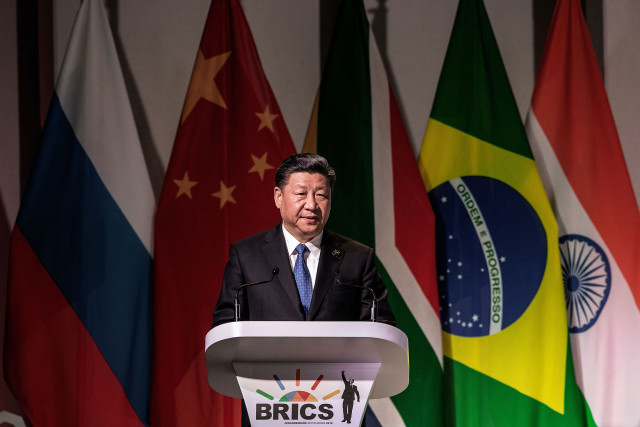Xi Jinping's Bold Moves: Debt Issuance and Central Bank Visit Bolster Chinese Economy
- Posted on October 25, 2023
- Business
- By Arijit Dutta
- 496 Views
In a remarkable move to bolster the Chinese economy, Chinese President Xi Jinping has taken substantial measures, including the issuance of additional sovereign debt and an unprecedented visit to the central bank, the People's Bank of China (PBOC). These actions reflect China's commitment to shoring up its financial stability and economic growth.
 Image Source -www.bloomberg.com
Image Source -www.bloomberg.com
In a remarkable move to
bolster the Chinese economy, Chinese President Xi Jinping has taken substantial
measures, including the issuance of additional sovereign debt and an
unprecedented visit to the central bank, the People's Bank of China (PBOC).
These actions reflect China's commitment to shoring up its financial stability
and economic growth.
The nation's legislature
has given its approval to a plan that significantly increases the fiscal
deficit ratio for 2023, raising it to approximately 3.8% of the gross domestic product
(GDP). This is notably higher than the 3% limit set in March, which was
traditionally regarded as the government's threshold. The plan also encompasses
the issuance of an additional 1 trillion yuan ($137 billion) in sovereign debt
during the fourth quarter, primarily directed toward supporting disaster relief
and construction efforts.
Such a mid-year
adjustment to the budget is rare for China, with past instances occurring
during critical periods like the aftermath of the Sichuan earthquake in 2008 and
the Asian financial crisis in the late 1990s. Experts believe that this
additional fiscal support was necessary to prevent a sudden fiscal tightening
in the closing months of the year.
These budget changes
were part of a series of announcements from the Standing Committee of the
National People's Congress, emphasizing the government's heightened concern
about the economic outlook in the coming year. The unprecedented visit by
President Xi to the central bank further underscores the administration's commitment
to financial stability and economic growth.
This move to raise the
fiscal deficit and issue more sovereign debt is intended to help China achieve
its official government growth target of approximately 5% for 2023. While
stronger-than-expected data for the third quarter has increased confidence in
reaching this goal, several challenges, including ongoing property market
turmoil and deflationary pressures, are expected to persist into 2024.
Additionally, a
significant portion of the special bond issuance will be allocated to fund
post-disaster reconstruction, effectively providing a fiscal stimulus of around
0.8% of GDP. This stimulus aims to support China's recovery in 2024,
particularly against headwinds from declining property construction and exports.
In a noteworthy policy shift, the Chinese government plans to finance infrastructure investment through sovereign bond issuance, shifting more of the fiscal burden to the central government. These funds will be transferred to local authorities for use in various projects.
Also Read:
To further support local
governments facing fiscal challenges, Beijing has initiated a program that
allows struggling regional authorities to exchange high-interest
off-balance-sheet borrowing for lower-interest bonds. The private sector is
also receiving attention, with measures being taken to eliminate barriers and
promote fair competition between private and state-owned enterprises.
In a bid to fortify the
private sector, Xi has reiterated support for private entrepreneurs and called for
their closer alignment with the Communist Party. The People's Bank of China has
pledged to make policy adjustments more targeted and forceful while keeping an
eye on the economy's long-term prospects, indicating that further easing
measures may be in the pipeline.




